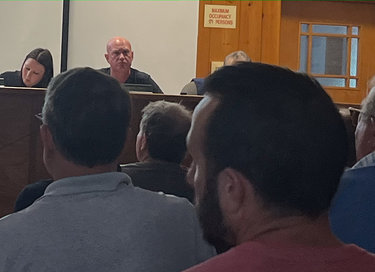Dozens show up in support of Westerlo Planning Board at abolishment hearing
WESTERLO — On the same evening that an unprecedented number of Hilltown residents were stuffing the Berne-Knox-Westerlo ballot box with rejections of the school budget, Westerlo residents were stuffing themselves into a crowded town hall to show their displeasure with a proposal to eliminate the town’s planning board.
More than two dozen were present at the public hearing for the proposal on June 18, having filled every parking space and seat available, just about a month after Supervisor Matt Kryzak announced his interest in abolishing the planning board and passing its duties onto the zoning board of appeals.
He claims that this will speed up the planning process while saving the town somewhere around $10,000 on salaries and benefits.
Notable opponents of the idea, most of whom spoke at the meeting, were town board members Josh Beers and Peter Mahan; former town board member Joe Boone; zoning board Chairman George Spahmer; acting planning board Chairman Bill Hall; planning board members Angela Carkener and Gerry Boone; and clerk to both the planning and zoning boards Claire Marshall, who had also relayed some concerns on behalf of code enforcement officer Jeffry Pine.
Outside support
Aside from Kryzak, the only people who spoke in support of the law at the hearing were two men he had been invited from out of town: Rob Nolan, who is currently on the recently-combined planning/zoning board in Coeymans; and Jon Cinque, who was on the planning board in Ravena until it was abolished, at which point he joined that town’s zoning board.
“A single, combined board could be tried for a year and, if it becomes problematic, the two boards can be restored,” Nolan said. “The combined board would provide a faster, more efficient approval process, and the town board can also choose to act as its own board of appeals.”
As Carkner would later point out, however, Nolan and Cinque were both at the center of an Article 78 proceeding in Coeymans along with Westerlo’s attorney, George McHugh, who was the supervisor in Coeymans until January after being ousted last November.
Article 78 proceedings are typically brought by citizens to challenge local governments or state agencies.
Supreme Court Justice Justin Corcoran had ruled in November 2023 that Nolan, despite recusing himself, had unlawfully influenced the planning board before it rejected an application from Long Energy, owned by Marebo LLC, a propane business that competed with Nolan’s own business.
“Specifically, he directly participated from the dais during the February 13, 2023 meeting when the propriety of opening the public hearing was debated, prompting a contentious exchange with the board’s counsel, who resigned several days after Nolan’s counsel complained about him to the supervisor,” Corcoran wrote in his judgment.
Nolan had also guided the appointment of Cinque as an alternate member of the combined board, which the court viewed as an extension of Nolan’s efforts to affect the outcome of the Long Energy application, referred to in court documents as the Marebo project. Alternates fill in for board members who are absent or have recused themselves.
“According to the public statements of three planning board members, Nolan discouraged the board from interviewing each applicant and reported to McHugh that a ‘majority’ of the board (himself necessarily included) preferred Cinque …,” Corcoran wrote. “Cinque seemingly admitted at the first meeting after his appointment that he obtained documents about the Marebo project from Nolan.”
The judge also noted that Nolan had retained counsel to speak in support of him during meetings.
Corcoran's judgment also states that the planning board’s ultimate rejection of the application was arbitrary and capricious aside from Nolan’s influence, being without any substantial basis, and that Nolan had unlawfully directed the Coeymans Town Clerk, Candace McHugh, who is George McHugh’s sister-in-law, to reject a Freedom of Information law request from Marebo.
The town is appealing.
Opposition
George McHugh was not at the public hearing in Westerlo, but still loomed over it. Some, like Carkner, believe the idea of eliminating the planning board stems from an incident last month where McHugh clashed with the planning board over a recommendation that an engineer look over an application for a powder-coating business.
McHugh had walked out of that meeting and got into a verbal spar with town board member Josh Beers, who has long been critical of McHugh.
McHugh’s post as Westerlo’s town attorney had been an election issue in 2023 with Kryzak backing McHugh, and Carkner, who ran unsuccessfully against Kryzak, critical of McHugh. Both Carkner and Kryzak are Republicans; Carkner ran on her own line, garnering 27 percent of the vote.
“We, the planning board, are free thinkers,” Carkner said at the public hearing. “We seek knowledge from government agencies, take the information provided to us, and, as individuals, make a decision. What is happening here is retaliation for our free thinking.”
Kryzak has said that this proposal actually goes back to 2021, when Bill Bichteman was supervisor, and was revived when he felt that the zoning board was strong enough to handle the extra workload.
Carkner also criticized the town board — specifically Kryzak and the two board members who often side with him on mixed votes, Amie Burnside and Lorraine Pecylack — for not appointing planning board member Bill Hall to the zoning board when they knew they were interested in abolishing the planning board.
Carkner said that the town was depriving itself of experienced residents by eliminating the planning board, a point that many other speakers reiterated.
Both the planning board and zoning board are five-member boards. The proposed local law would eliminate the planning board and add an alternate member to the zoning. However, Kryzak told The Enterprise after the hearing that the county planning board on Thursday had recommended that the town increase the number of members.
“Albany County planning board isn’t super excited about the concept of combined boards but recommends if we do it to have a 7 member board like Coeymans,” he said.
Gerry Boone told the town board at the hearing that having more voices is key to preserving the interests of the town.
Boone is the most senior member of the planning board, having been among the first people who was appointed to it 17 years ago, when it was re-created 15 years after the town had abolished it for reasons very similar to the ones Kryzak cites. At the time, however, in 1992, there were more vocal proponents of the elimination than there are now.
Boone also challenged the notion that eliminating the planning board was the best way to speed up the application process for builders.
“Perhaps, instead of doing away with the planning board, we could meet more often — say, twice a month, if necessary,” he offered.
Boone went on to dismiss the advice of Kryzak’s two invitees, asking, “Why would we copy a town like Coeymans and Ravena? We aren’t anything like them.”
Kryzak responded to Boone’s comments by attacking a recent decision by the planning board to approve the powder-coating business’s application on the condition that the Albany County Planning Board gives it the OK — which it ultimately did not, meaning that the board will need to revote and approve the application with a supermajority to override the county’s recommendation .
Kryzak cited a New York State Department of State introductory course for planning board members, which says, “It is important that the local planning board does not take action prematurely. The board cannot take early votes conditioned on the county planning agency’s later recommendation for approval.”
“Did I witness that the other night?” Kryzak asked, with Boone affirming.
Kryzak then asked, “Should I be concerned about the Article 78 potential for that?”
Boone said that he didn’t think so, adding that the planning board “had the advice of three different attorneys on that.”
Conditional approvals are not unheard of. The Knox Planning Board issued one for a solar project in 2021, but had to revote on the application when the county sent the application back with a disapproval. Planning boards can override the county’s recommendations when they have a supermajority.
Zoning board Chairman George Spahmer said at the hearing that a combined-function zoning board would likely be strained by the additional workload, and lack the “expertise and specialization” held by current members of the planning board.
He said that zoning board training does not extensively cover planning matters, “so there’s definitely a little uphill climb there.”
Spahmer also said that, while it’s true the boards experience slow months — which Kryzak has used as a justification for the elimination — the workload on the planning board can be “substantial at times.” Things like solar projects, he said, “can be very complex and time-consuming.”
He said he believed Kryzak had good intentions behind his proposal, but implored the board to consider “the breadth and depth of experience” that would be lost if the proposal goes through.
Gwen Mackey said she didn’t think the money saved “would be worth it at all,” considering the distinct functions that planning and zoning boards serve, and the fact that the planning board members would not necessarily be added to the zoning board.
Planning and zoning clerk Claire Marshall said that the planning board handles the majority of applications in the town and has the most experience. She said that Pine had suggested the boards meet twice a month, but that this was rebuffed by McHugh.
“If you do not do two meetings per month, you are not going to streamline things for anyone,” she said, explaining that the particulars of sending applications to the county makes timing an issue when people need a relatively quick answer.
Tom Dietrich said that he felt the abolishment of the planning board in the 1990s was about “taking care of the right people” — friends of the government — and was “wondering if that was the case here as well. Hopefully not.” He went on to say that if money’s an issue, there are other places to save.
Bill Hall said that the delays Kryzak was keen on removing were a “feature, not a bug” of the system, saying that “a different set of skills and a different set of eyes” are better able to scrutinize potentially problematic projects.
One man told the board to remember the pledge of allegiance that opens every meeting, and that, as representatives, they’re there to serve the interests of the residents and do their bidding.
Joe Boone, one of the last speakers, said that the comments up to that point were “poignant” and fair before going on to offer his perspective as a former town board member.
“When you sit on this board, or any board for that matter, it’s a matter of earning two things from the people you represent: their trust and their confidence in you to make the right decision, not only for these people in this crowded room, but for all 3,700-plus people that reside in this town,” he said.
“And what I think is happening, or what could potentially happen with this proposal, is that you are disregarding the trust and confidence of the people that allowed you to sit in the chair and serve this community, and I would beg you to reconsider this proposal to abolish a well-seasoned, experienced, dedicated planning board.”
After the hearing, Kryzak told The Enterprise he was “disappointed that many people in attendance were not open to new ways of potentially improving efficiency and decreasing operational costs.”
He said that savings is not just in salaries but retirement contributions, and that it is easier to staff a single board with a limited applicant pool than two.
“People in general are resistant to change even when it’s for the better,” he said.



